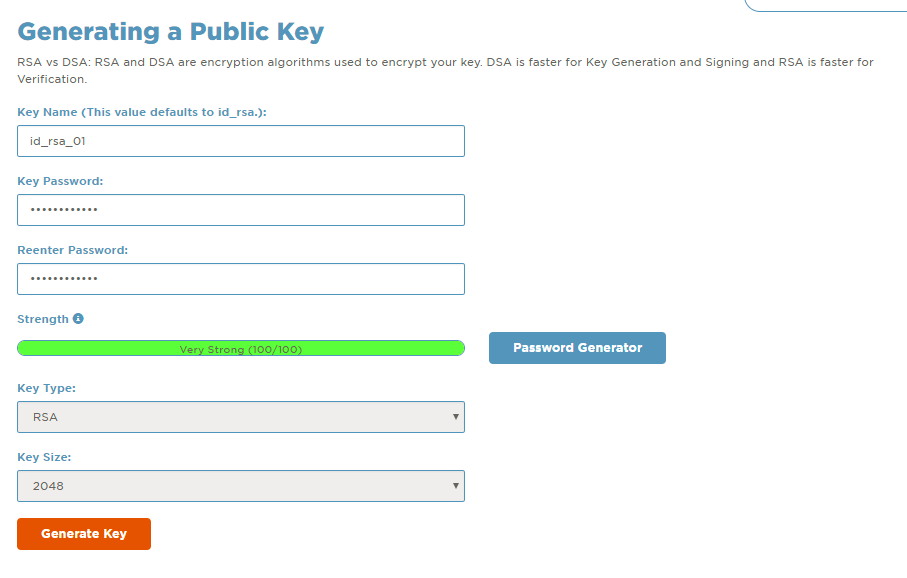

- Acrosync generate public key install#
- Acrosync generate public key windows 10#
- Acrosync generate public key code#
- Acrosync generate public key free#
Acrosync generate public key windows 10#
The username on your Windows 10 computer does not need to match the user account name on your TrueNAS server. -delete does not need to be invoked when using -delete-delay. Pay close attention to the trailing slash ( / ) for the source and destination. The source and destination paths can work with variables or the "/cygdrive/c/" format. -log-file: where the log file is to be stored. -info: what type of information to include in the log file. -delete-delay: the speed of -delete-during, but deletes missing files from the source after the upload/update process finishes first.  -no-whole-file: used by default for rsync over SSH, but still nice to explicitly write out. -inplace: do not make copies of files being updated ( very important for ZFS destinations).
-no-whole-file: used by default for rsync over SSH, but still nice to explicitly write out. -inplace: do not make copies of files being updated ( very important for ZFS destinations).  The next line clears the log file, since rsync appends to the log, which can keep growing in size. Rsync -v -a -H -h -inplace -no-whole-file -delete-delay -info=BACKUP,COPY,DEL,REMOVE,SKIP,STATS -log-file="/cygdrive/c/Users/winnielinnie/AppData/Roaming/cwrsync/rsync_to_nas_log.txt" /cygdrive/c/Users/winnielinnie/ The first line waits 15 seconds (which might be ideal if invoking this script upon waking up the computer) bin folder with the following template, change it to reflect your preferences, and name it something like rsync_to_nas.batĭEL /F /Q "%APPDATA\cwrsync\rsync_to_nas_log.txt" Setup the rsync command and options to be run when invoked on the client (Windows) This user will need read and write permissions for the dataset / directory to be sync'd on the server. ssh hidden folder has read, write, execute (rwx) permissions only for User not Group nor Other After saving these changes, double-check that the User's. Copy + paste the the public key (previously generated) in the "SSH Public Key" form (or upload it to the server). Make sure to assign them a real home directory (cannot use "/nonexistent"), and give this directory read, write, execute (rwx) persmissions only for User not Group nor Other. Create a new user account (or use any existing account). Create a public/private key pair with ssh-keygen (from the cwRsync package). bin in your User's home directory this is where the. Now rsync can directly be invoked from the Command Prompt, PowerShell, or batch file (.bat) without specifying the executable or entire path. Enter or paste C:\Program Files\cwrsync\bin. This is done via Control Panel > System > Advanced System Settings > Environment Variables. Add to your User's Path the following entry: C:\Program Files\cwrsync\bin.
The next line clears the log file, since rsync appends to the log, which can keep growing in size. Rsync -v -a -H -h -inplace -no-whole-file -delete-delay -info=BACKUP,COPY,DEL,REMOVE,SKIP,STATS -log-file="/cygdrive/c/Users/winnielinnie/AppData/Roaming/cwrsync/rsync_to_nas_log.txt" /cygdrive/c/Users/winnielinnie/ The first line waits 15 seconds (which might be ideal if invoking this script upon waking up the computer) bin folder with the following template, change it to reflect your preferences, and name it something like rsync_to_nas.batĭEL /F /Q "%APPDATA\cwrsync\rsync_to_nas_log.txt" Setup the rsync command and options to be run when invoked on the client (Windows) This user will need read and write permissions for the dataset / directory to be sync'd on the server. ssh hidden folder has read, write, execute (rwx) permissions only for User not Group nor Other After saving these changes, double-check that the User's. Copy + paste the the public key (previously generated) in the "SSH Public Key" form (or upload it to the server). Make sure to assign them a real home directory (cannot use "/nonexistent"), and give this directory read, write, execute (rwx) persmissions only for User not Group nor Other. Create a new user account (or use any existing account). Create a public/private key pair with ssh-keygen (from the cwRsync package). bin in your User's home directory this is where the. Now rsync can directly be invoked from the Command Prompt, PowerShell, or batch file (.bat) without specifying the executable or entire path. Enter or paste C:\Program Files\cwrsync\bin. This is done via Control Panel > System > Advanced System Settings > Environment Variables. Add to your User's Path the following entry: C:\Program Files\cwrsync\bin. Acrosync generate public key install#
Install it to C:\Program Files\cwrsync\. This command opens your home directory in VS Code. 
On your desktop, open a terminal session and run the command below. Follow the steps below to generate an SSH key pair.ġ. But in this example, you’ll generate the ED25519 key pair as it is considered more secure than RSA keys. GitLab supports two types of SSH key pairs, the RSA and ED25519 SSH keys. And if both keys match, the authentication passes. In a nutshell, the private key is what the client (your computer) presents to the server (Gitlab) for authentication, and the public key is what the server uses to decode your private key. SSH keys or a key pair is consists of private and public keys.
Acrosync generate public key code#
Related: A Beginner's Guide to Visual Studio Code and Git Generating a Gitlab SSH Key Pair The example in this tutorial will be using VS Code 1.62.3. The latest version as of this writing is 2.25.1. This tutorial will be using an Ubuntu 20.04 LTS computer but should work with Windows and macOS too. A computer to use as your Gitlab SSH client.
Acrosync generate public key free#
If you don’t have one yet, sign up for a free account first. To follow along, be sure to prepare the following requirements. This tutorial is a hands-on demonstration.
Adding the Gitlab SSH Key to Your Profile.








 0 kommentar(er)
0 kommentar(er)
